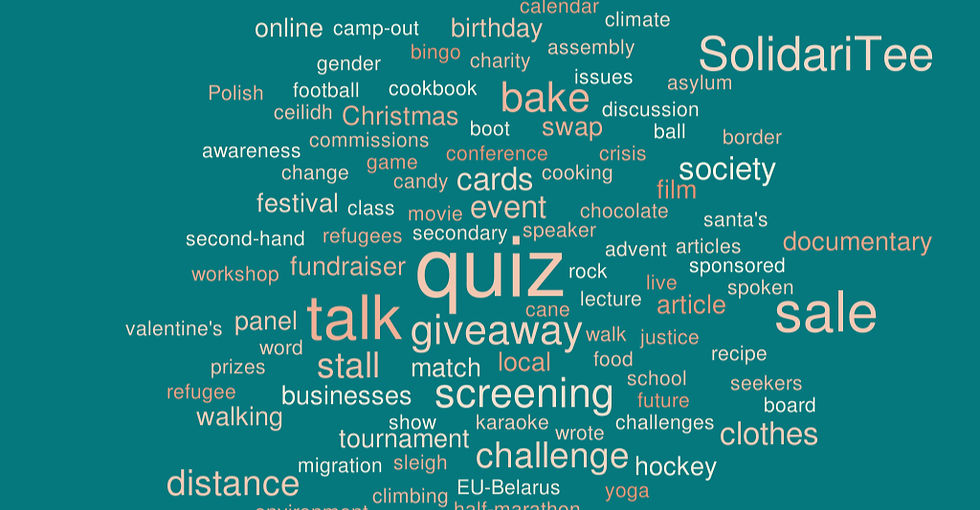Mobile Info Team : A positive force for change in a daunting landscape
- Cidalia Lewis Lettington

- Aug 5, 2022
- 3 min read
Mobile Info Team (MIT) are one of the legal aid NGO’s that has received continued support from SolidariTee since 2019. Their advocacy centres around the rights of refugees and asylum seekers, with the overarching aim of ensuring fair and efficient access to asylum on mainland Greece.
They occupy a unique position in the Greek civil society ecosystem because they have developed a system in which person-centred legal assistance can be provided at the individual level, whilst also providing crucial information at scale, reaching tens of thousands of displaced people through their social media and hotline channels.
In 2021, their facebook posts received 649,000 interactions, a testament not only to the scarcity of information available, but of the value in having a hub for multilingual information.
MIT are based in Thessaloniki, mainland Greece, and was founded in 2016 by Michael Kientzle, a German National. Their caseworkers and lawyers come from a variety of different backgrounds and nationalities, however, a huge focus for them is synthesis with the Greek and German infrastructures and environment. In many cases, asylum seekers who have arrived in Greece may have family members in Germany, who in 2021 was the biggest host country in Europe, having welcomed more than 1.2 million refugees. However, the process of family reunification is incredibly complicated, with strict timelines and bureaucratic processes. Within Greece itself, asylum laws and processes change almost constantly, and effectively representing and supporting those going through the process of seeking asylum requires in-depth local knowledge. Therefore, they look to take on as many native lawyers and caseworkers to ensure full support for complex cases.
MIT is undoubtedly an example of a positive and independent force for change which is sorely needed in the current climate. Since August 2020, legislative changes by the Greek administration have worsened the already dire living conditions of refugees and asylum seekers.
Some barriers contributing to the hostility of the application system include the unilateral decision of Greece to declare Turkey a safe third country for most asylum seekers, the substitution of skype pre-registration with a new procedure which forces people into prison-like detention centres, and a change in deportation and asylum framework making it easier for authorities to detain and deport asylum seekers.
This is all in addition to a lengthy application processes plagued with bureaucracy, lack of state-provided aid and withholding of key information by authorities, leading to rejections over technicalities.
MIT provides individual case support and assistance to individuals on a variety of legal matters, for example, family reunification cases and the registration of extremely vulnerable applicants’ claims for international protection. The support offered varies depending on the assistance required for each case - a personal, tailored approach that ensures efficiency and diligent follow up procedures so that cases aren’t left in stasis. This approach also enables the maintenance of working relationships with beneficiaries, many of whom report a very high user satisfaction rate. The MIT team is made up of caseworkers, translators, lawyers and administrative staff with a lot of the work being done in a range of languages including Arabic, Farsi, Urdu, Kurdish, French and English.
Publicly available reports produced by MIT continue to be extremely pertinent and have been used in influential decisions affecting the legislative framework surrounding the asylum process. One such example is their Accommodation Report which shows the living conditions of applicants and beneficiaries of international protection. It highlights the precarity displaced persons are exposed to due to inadequate asylum policies. This very report was quoted by the High Administrative Court of Bremen in November 2021 in their ruling that persons applying for asylum in Germany after receiving a status in Greece cannot be returned to Greece due to the challenging living conditions for beneficiaries of international protection in Greece. Alongside this, MIT continue to collaborate with organisations from all over Greece to publish policy briefs, open letters and UN submissions to advocate for refugees and asylum seekers in the complex European asylum system.
SolidariTee are proud to support such a dynamic and effective organisation that is continuing to evolve to best suit the needs of those it serves.

Written by Cidalia Lewis Lettington. Cidalia is half-Burundian, half-Scottish and was born and raised in Nairobi, Kenya. She is about to enter her final year of her Common Law with French Language degree at the University of Glasgow as well as having recently completed a year studying abroad at Sciences Po Paris. Alongside her studies and and SolidariTee, she works with Protimos- an NGO helping to develop legal infrastructure and bring community interest cases across Africa. Cover photo is the team at Mobile Info Team.






Comments